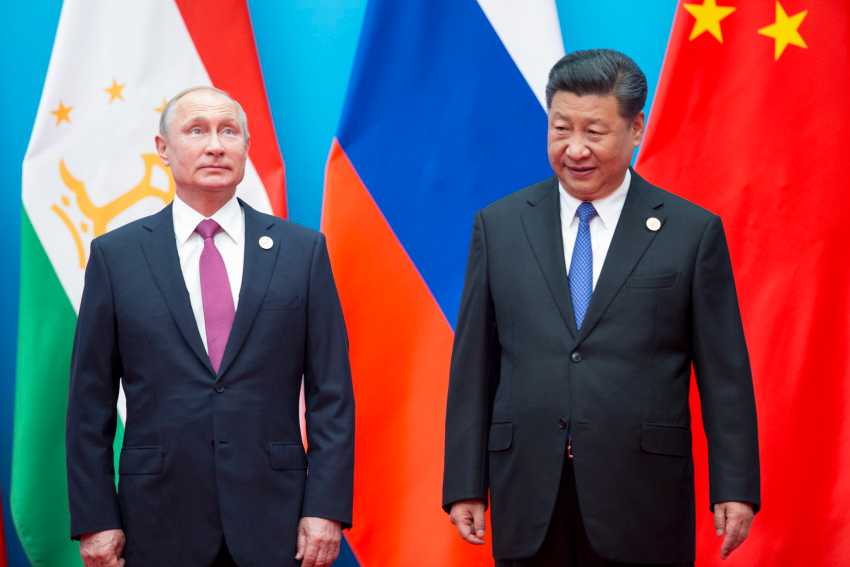China's Xi heads abroad to promote strategic role

President Xi Jinping is using his first trip abroad since the start of the pandemic to promote China's strategic ambitions at a summit with Russia's Vladimir Putin and other leaders of a Central Asian security group.
The Chinese leader is promoting a “Global Security Initiative” announced in April following the formation of the Quad by Washington, Japan, Australia and India in response to Beijing's more assertive foreign policy. Xi has given few details, but U.S. officials complain it echoes Russian arguments in support of Moscow's attack on Ukraine.
Xi, 69, is due to meet Putin in Uzbekistan this week at a summit of the eight-member Shanghai Cooperation Organization, which also includes Uzbekistan, India and Pakistan.
“China and Russia share the same stance in opposing the Western practice of imposing sanctions and overthrowing regimes of other countries,” said Li Xin, director of Shanghai University of Political Science and Law’s Institute of European and Asian Studies.
Xi’s trip at a time when his government is urging the Chinese public to avoid foreign travel under its “zero COVID” strategy emphasizes the importance to the ruling Communist Party of asserting China's role as a regional leader.
The summit takes Xi abroad at a time when the party is preparing for an October congress where he is expected to break with political tradition and try to award himself a third five-year term as leader.
That suggests Xi, China's most powerful leader since at least the 1980s, is confident he doesn't need to stay home to make political deals. It also might help to promote his standing with nationalists in the ruling party.
Xi’s government has refused to criticize Putin’s attack on Ukraine. It accuses the United States of provoking the conflict. Xi has participated in other global gatherings by video link. His only trip outside the Chinese mainland since early 2020 was a one-day visit to Hong Kong to mark the 25th anniversary of the end of British colonial rule.
Other SCO governments are Kazakhstan, Kyrgyzstan and Tajikistan. Iran and Afghanistan are observers. “The Shanghai Cooperation Organization is attracting more countries with a new principle that is completely different from the West in handling relations between nations,” Li said.
China sees the group, founded under Xi's predecessor, Hu Jintao, as a counterweight to U.S. alliances across East Asia to the Indian Ocean. Beijing has taken part in in multi-government military exercises, showing off its fast-developing forces.
Relations with Washington, Europe, Japan and India are increasingly tense over complaints about trade, technology, security, Taiwan, Hong Kong, human rights and territorial conflicts at sea and in the Himalayas.
Meeting Xi is a boost for Putin, who is isolated following his invasion of Ukraine. Xi declared the two governments had a “no limits” friendship when the Russian leader attended the Winter Olympics in Beijing ahead of the Feb. 24 attack.
In April, Xi said the “Global Security Initiative” was intended to ”uphold the principle of indivisibility of security” and “oppose the building of national security on the basis of insecurity in other countries.” Despite the bland language, U.S. officials and Asian security analysts see Xi's initiative as a tactic by China, with the world's second-largest military after the United States, to dominate the region.
A State Department spokesman, Ned Price, said in April it appeared to “parrot some of what we have heard coming from the Kremlin” as justification for the attack on Ukraine. “This is a blatant effort at the pursuit of an Asian hegemony by China,” wrote Rajeswari Pillai Rajagopalan of the Observer Research Foundation, an Indian think tank, in The Diplomat. It is “designed to promote China’s interests in its great power competition with the United States.”
At a July meeting, Foreign Minister Wang Yi told his Russian counterpart Sergei Lavrov, that China would “strengthen strategic communication” with Moscow about international security, according to a statement by the Chinese Ministry of Foreign Affairs. That will “show the basic momentum of China-Russia comprehensive strategic partnership” and “practice true multilateralism,” the ministry statement said.
